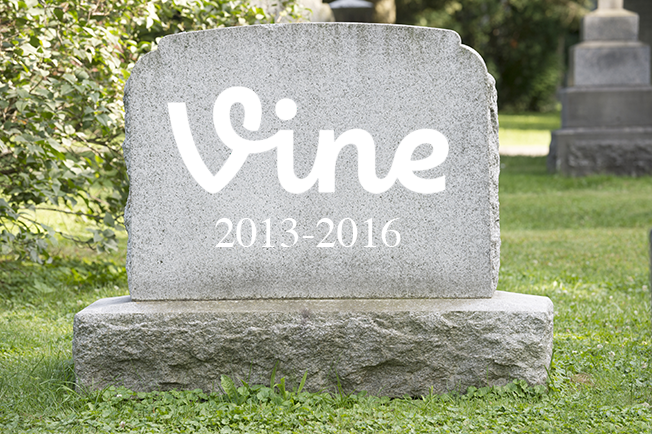
Pour out a 40 and loop the video repeatedly until you scroll away for Vine.
Twitter announced last week that it's discontinuing the mobile app, which allowed people to shoot and instantly share short videos, but will maintain the app and website so the content won't disappear forever. You just won't be able to create new video or continue engaging with what's there.
Vine was introduced in 2013 and was purchased by Twitter before it even officially launched. Those were the days before Snapchat, Periscope and Facebook Live, when social video was still very experimental and the app was, at the time, pretty revolutionary. It never really caught on with the mainstream audience, though, eventually becoming a place for a core group of talented and eccentric creators to share funny and sometimes informative videos.
A study from just a few months ago showed over half the app's users who had more than 15,000 followers had abandoned it for other platforms like Snapchat. While there were certainly hints that the future was not bright for Vine, Twitter was still innovating on the app as of just a few months ago, making changes to the time limit of video, which made the shutdown feel somewhat sudden.
Brand publishers had similarly experimented with Vine in the months following its launch, largely as a way to get headlines, though their efforts either tailed off over time or were redirected to working with influencers instead of producing content themselves.
As usual, movie studios were among the first to play around with marketing their movies on Vine, making headlines while doing so. Just two months after the app launched, 20th Century Fox debuted a teaser for the trailer for The Wolverine, Hugh Jackman's second solo outing as the fan-favorite X-Men character. That was notable not just because of the use of the brand-new platform but because "teasers for trailers" wasn't a widespread tactic at that point, though we're all too used to it now.
Unfortunately, Hollywood's approach to Vine was epitomized by that execution. The Vine account for the movie still has just that one video on it. Nothing more for The Wolverine and nothing for Logan, the upcoming third part of the trilogy. While it's hard to find specific examples of which movies did or didn't execute on Vine, it's easy to extrapolate based on how studios have approached their brand accounts.
Paramount Pictures: Three total posts, including two in May 2013, when it appears they were going to use it to provide a behind-the-scenes look at the studio. Nothing since a February 2015 video for the latest Spongebob Squarepants movie.
20th Century Fox: Six posts, all from June or July 2015 and almost all from either the red carpet event for the Melissa McCarthy comedy Spy or from Hitman: Agent 47's San Diego Comic-Con activation.
Warner Bros. Pictures: 21 posts, beginning in February 2014 and actually going all the way up to April of this year, with a video promoting Keanu. A good chunk of these come from December 2015 as director Ron Howard took over the account to promote In The Heart of The Sea.
Sony Pictures: 17 posts and very infrequent. Most recently (April 2015) there were promo videos for the Paul Blart sequel, but before that there were sporadic posts for Hotel Transylvania, Fury and the Annie remake.
MGM: Nothing, but hey, they racked up almost 36,000 followers without doing a single thing.
Universal Pictures: Again, nothing here, but an even more impressive ROI for no effort, accumulating 93,000 followers.
Smaller studios took different and more innovative approaches to the platform. Independent distributor Oscilloscope Laboratories, which not only promoted their David Cross-starring coming It's a Disaster on Vine in 2013 but released the whole movie there in six-second bursts, which is certainly an interesting way to watch an entire feature film. And just a few months ago, the independent movie FML, an independent film starring well-known Vine talent, all about the culture of chasing Likes and Followers, usually in the pursuit of either romance or sponsorship dollars, was released.
Vine's final chapter is one of a lot of potential that was just never tapped. It's also notable that while Twitter as a whole comes under increased fire for the hateful and abusive speech leveled by some of its users toward women and people of color, those are the same groups that found a home in Vine's creative community.
For many brands, it just never fit in well with their overall content marketing mix, requiring too many resources to really make an impression. That potential will now never be fully realized.